What if you come to know how great the best summer fruit, the king of all fruits, the delicious and appetizing mango is for the skin? Although eating mangoes improves the health of almost every organ and system of the body, applying it directly on the face makes the largest organ of the body radiant and ageless.
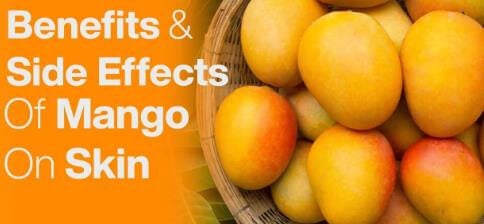
Now, you would wonder how and if this claim is backed up by some study or if it is just fluff, right? Well, as you move on with this article, you would realize how beneficial mango is for the skin along with the ways to use mango.
Also, the potential yet uncommon side effects of mango are also mentioned in it. So, what are we waiting for? Let us get into it.
Constituents of a Mango
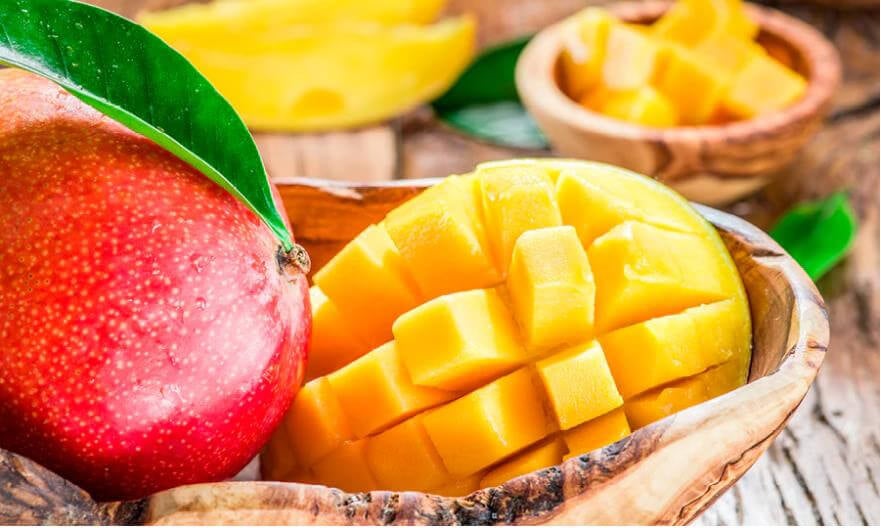
Mango is full of amino acids, vitamins, antioxidants, and minerals which our body as well as our skin requires to stay in the best of shape and health. The noteworthy constituents of mangoes include vitamin C, vitamin A, vitamin E, vitamin B6, calcium, copper, selenium, AHAs, polyphenols, beta-carotene, and prebiotics. While most of the nutrition of the mango is in its pulp, the kernel and the peel are not without benefits.
These parts can be used to make mango products for skincare like mango butter. Furthermore, an extensive
study
on nutrients in different parts of mango elaborates on the use of mango for skin [1].
Benefits of Mango on Skin
1. Skin Supplementation

Our skin needs nutrients like anti-oxidant and anti-aging vitamins, skin-hydrating minerals, sun-protective microelements, and exfoliating acids. Mangoes contain all of them which we are going to discuss in each heading.
When skin is supplied with all the nutrients it needs in the form of topical mango application, it heals from the inside out as discussed in
research
[2].
2. Role in Collagen Production
The vitamin involved in making the skin firm, improving its elasticity, and reducing premature aging is vitamin C. Mango is a good source of vitamin C.
So, it stimulates the skin to produce collagen, a protein that helps in improving the connective tissue structure of your skin while making it plump.
3. Protection From Damage Caused by Sun
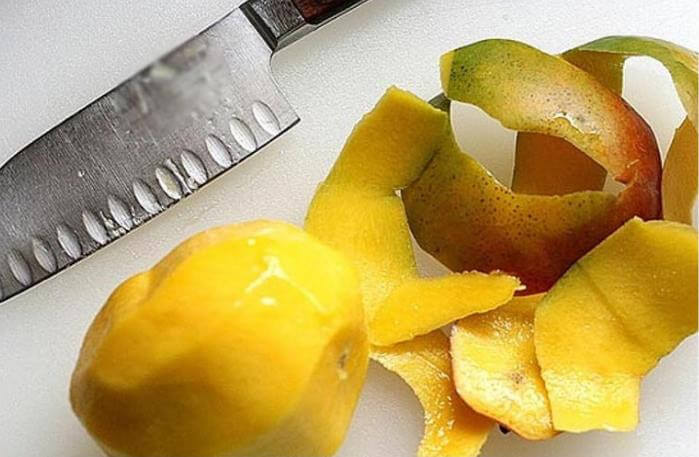
Sun damage is caused by the formation of oxidants and free radicals in the skin. Mango contains antioxidants and polyphenols. These fight the damage causing sun rays and also the damage that has already been caused by the sun.
An
experiment
was carried out in hairless mice to prove the role of mangos in sun protection. However, mango is not enough to save you from the sun. So, follow the
tips to skin safe
in the summer [3].
4. Anti-Aging Effects
The presence of vitamin E, vitamin C, and retinol impart anti-aging properties to the mango. While vitamin C, E, and B protects the skin from environmental factors like pollution, vitamin A repairs the skin and reduces the signs of aging like flaky skin, wrinkles, and sagging skin.
These nutrients have a role in anti-aging as explained in a
study
[4]. Also, check out the
best anti-aging fruits and vegetables
here.
5. Prevention of Skin Cancer
Mango peel, kernel, and seed contain a high amount of anti-cancer agent called mangiferin. It is a polyphenol that works in repairing DNA damage which is the cause of cancer.
Applying it on the face reduces the incidence of skin cancer and eating it can be helpful to prevent breast, colon, and cervical cancer as illustrated in
research
[5].
6. Improvement of Skin Tone and Texture
Mango improves skin tone because of the presence of skin-brightening ingredients in it. Rubbing mango skin on the face can eliminate dark spots and lighten the skin. In addition, it makes skin smooth and poreless by dealing with excess oil production, impurities build-up, and skin exfoliation.
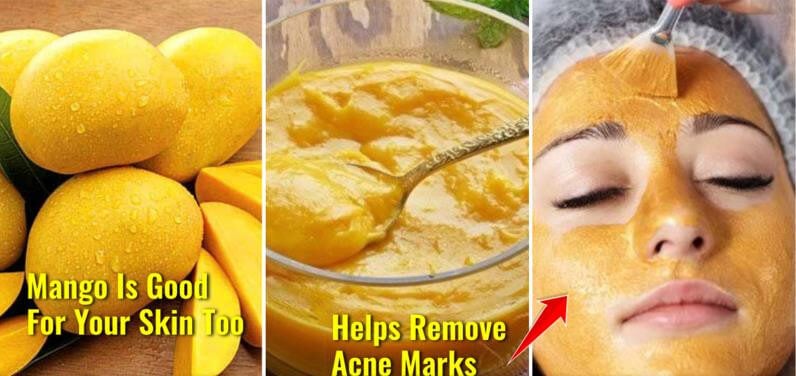
7. Reduction of Acne
There is a myth that eating mango causes acne. However, the science says the application of mango on the skin reduces acne. It is because of the presence of retinol that has non-comedogenic effects on the skin as it regulates oil and protein production.
8. Skin Rejuvenation
Mango has exfoliating and skin-rejuvenating properties. It has alpha hydroxy acids that remove dead skin cells and build-up of pollutants or products from the skin. It has minerals that cause the skin to regenerate new cells. Also, it has beta-carotene, flavonoids, and polyphenols that help in skin rejuvenation.
9. Adds Natural Glow to the Skin
Beta-carotenes in the mango boost skin immunity and save it from microbes, AHAs remove the cells that make skin dull, retinol deals with breakouts, vitamin C brightens skin tone, and vitamin E protects from sun damage.
Additionally, minerals play a role in hydrating the skin. When all these factors are added together, the skin naturally appears radiant, healthy, and glowing.
10. Reduces Skin Inflammation
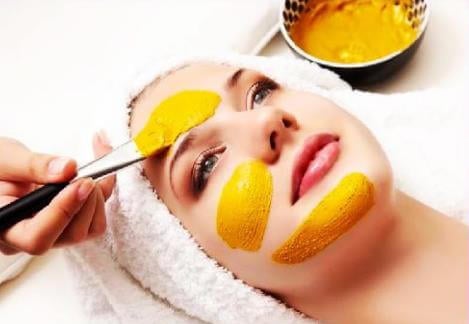
Mango extracts and oils can be used to treat inflammation, skin redness, and allergy flare-up in people suffering from eczema, persistent acne, or rosacea. It is because mango has magnesium with anti-inflammatory and anti-microbial properties.
11. Skin Hydration
Vitamin B6 of mango regulates moisture level in the skin, potassium hydrates the skin, and vitamin E preserves the skin barrier. Consequently, the skin appears supple and hydrated.
Also, you can remove the hair from the face long-lastingly with
Ulike Air3 IPL
as hairless skin absorbs the skincare products in a better way. This product is our recommended one because it is nearly painless and gentle on the skin.
12. Use in Skin Whitening
Mango can be used in skin whitening as it thoroughly nourishes the skin, protects its barrier, lightens dark spots, and reduces areas of hyperpigmentation. It also brightens the skin and protects it from tanning caused by the sun. Moreover, you can try the
best fruits that are good for skin whitening
to look fair.
Side Effects of Mango on Skin
1. . Skin Allergies
Although mango is a benign fruit that only confers benefits to the skin in most people, it can cause allergies as well. Its effect only occurs in people allergic to urushiol. As mango also has this chemical oil, it can sensitize the skin and cause mango or urushiol dermatitis as determined in a
study
[6].
The symptoms of this skin allergy are redness, inflammation, and rashes on the area that comes in contact with the mango.
2. Skin Damage Caused by Artificially Ripened Mango

Early in the summer season, mangos are ripened artificially by using chemicals. One of the commonly used chemicals is calcium carbide. It can cause rashes and a burning sensation on the skin. Also, it can damage the skin barrier if not removed immediately.
Moreover, some mango might be exposed to pesticides. The peel should not be used in this mango as explained in an
article
[7].
How to Use Mango on Skin
There are multiple ways to use mango on the face. Here, we have mentioned the common ones. So, let us see how to use mango for skin care.
1. Mango Face Masks
A number of mango face masks can be prepared at home using simple ingredients depending on the benefit you want. For example, mango and lemon juice can be used for hyperpigmentation, mango and green tea for anti-aging, or mango and honey for skin exfoliation.
2. Directly Rubbing Mango Skin on the Face
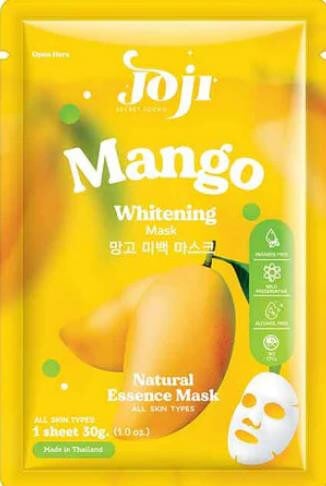
If you do not want to make it complex, simply peel off the mango in a way that its peel is thick and contains some pulp. Wash your face and directly rub the mango skin on your face for skin-brightening and anti-inflammatory effects.
3. Mango Packs
The mango pack is a mango face mask but it contains more than two ingredients. The more ingredients, the better results. So, you can use mango pulp, honey, and milk to make a glowing face mask; mango, yogurt, and honey to prevent acne; mango, oats, raw milk, and almond powder to make skin smooth.
4. Using Mango Containing Skincare
There are a number of skincare product lines that use mango as their base ingredients. The good thing about using pre-made mango skincare is that it does not feel sticky on the skin. Also, such products have used an optimal proportion of the nutrients in mango
5. Mango Butter
Mango butter is a fat that is obtained from the kernel and seed of the mango. With properties similar to cocoa butter, it moisturizes, hydrates, and supplements the skin. Moreover, it is non-comedogenic and lightweight on the skin.
Also, you can read out about the use of
mango butter in cosmetic formulations
in a scientific publication.
6. Mango Oil
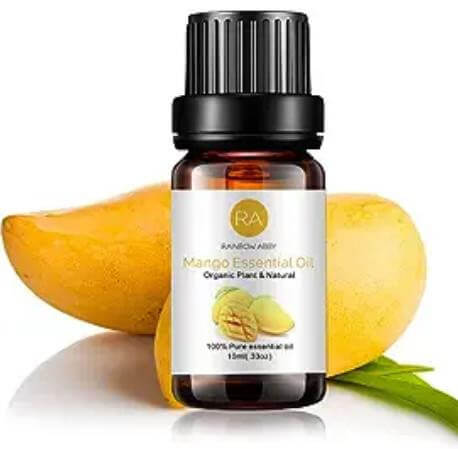
Mango oil is oil extracted from the seed of a mango. This oil works like a serum and can be infused into a skincare routine. Also, it contains a high concentration of minerals, vitamins, polyphenols, and mangiferin that penetrates deeply into the skin.
7. Mango Peel
As fresh mango is not available in all seasons, you can preserve mango peel for future use. Ensure that you buy organic mango, take off their peel, and let them dry. After that grind and store in an air-tight jar. This can be used to make mango masks, packs, or scrubs.
Summary
The benefits of mango on the skin are countless. This nutrient-rich fruit can be used in the form of a face mask, pack, scrub, oil, or butter. It helps in brightening the skin, preventing cancer, fighting sun rats, moisturizing it, nourishing skin cells, stimulating growth and production of new cells while removing the dead ones, and finally making skin glow.
Also, do not forget to pay attention to the study where such benefits of mango are proved.
References
1.
Veeranjaneya Reddy Lebaka
,
Young-Jung Wee
,
Weibing Ye
, and
Mallikarjuna Korivi
. Nutritional Composition and Bioactive Compounds in Three Different Parts of Mango Fruit. Jan 2021. International Journal of Environmental Research and Public Health. PubMed Central.
https://www.ncbi.nlm.nih.gov/pmc/articles/PMC7830918/
2.
S. D. Mandavgade
and
Vandana B. Patravale
. Formulation and Evaluation of Exotic Fat-Based Cosmeceuticals for Skin Repair. July to Aug 2008. Indian Journal of Pharmaceutical Science. PubMed Central.
https://www.ncbi.nlm.nih.gov/pmc/articles/PMC2792546/
3.
Jae Hyoung Song
,
Eun Young Bae
,
Goya Choi
,
Jin Won Hyun
,
Mi Young Lee
,
Hye Won Lee
,
Sungwook Chae
. Protective effect of mango (Mangifera indica L.) against UVB-induced skin aging in hairless mice. April 29, 2013. PubMed.
https://pubmed.ncbi.nlm.nih.gov/23458392/
4.
Silke K. Schagen
,
Vasiliki A. Zampeli
,
Evgenia Makrantonaki
, and
Christos C. Zouboulis
. Discovering the link between nutrition and skin aging. July 1, 2012. Dermato Endocrinology. PubMed Central.
https://www.ncbi.nlm.nih.gov/pmc/articles/PMC3583891/
5.
Muhammad Imran
,
Muhammad Sajid Arshad
,
Masood Sadiq Butt
,
Joong-Ho Kwon
,
Muhammad Umair Arshad
, and
Muhammad Tauseef Sultan
. Mangiferin: a natural miracle bioactive compound against lifestyle-related disorders. May 2, 2017. Lipids in Health and Disease. PubMed Central.
https://www.ncbi.nlm.nih.gov/pmc/articles/PMC5414237/
6.
Michael J. Yoo
, and
Brandon M. Carius
. Mango Dermatitis After Urushiol Sensitization. Nov 2019. CPC Emergency Medicine. PubMed Central.
https://www.ncbi.nlm.nih.gov/pmc/articles/PMC6861053/
7. Poonam Sachdev. Is It Safe to Eat Mango Peels? June 22, 2021. Health and Diet Guide. Nourish by WebMed.
https://www.webmd.com/diet/is-it-safe-to-eat-mango-peels
8. Vijai Shukla and Kaustav Bhattacharya. Mango Butter in Cosmetic Formulation. June 2022. Research gate.
https://www.researchgate.net/publication/331936276_Mango_Butter_in_Cosmetic_Formulations

 By myulikeadmin
By myulikeadmin



